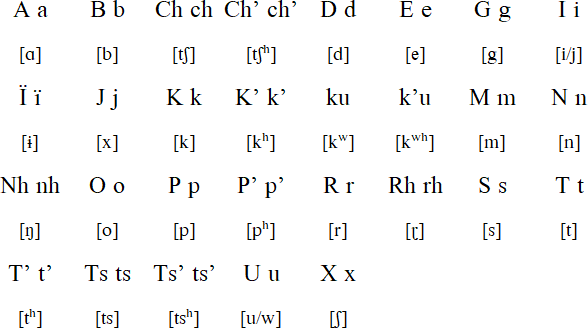Purépecha is a language isolate spoken by some 175,000 people in the highlands of the Mexican state of Michoacán. Purépecha was the principal language of the Tarascan state, which was founded in the early 14th century, occupied more or less same area as Michoacán, and fell to the Spanish in 1530. Purépecha is also known as Tarascan as a result.
The word Tarascan, or tarasco in Spanish, comes from the Purépecha word for father-in-law / son-in-law, tarascue.
After the Spanish conquest of the Tarascan state, Spanish Friars devised a way to write Purépecha with the Latin alphabet, and taught it to the Purépecha speakers. A number of dictionaries, grammars and other materials were published. From the early 18th century speakers of indigenous languages like Purépecha were encouraged to adopt Spanish and to abandon their native languages. This changed in 2003 when the General Law of Linguistic Rights of Indigenous Peoples gave Purépecha and other indigenous Mexican language official status as national languages.

Download an alphabet chart for Purepecha (Excel)
Iamendu k'uiripuecha janguarhiparini ka majku jarhati ka jurhimbekuecha jingoni kueraaηasondikso ka, juajtakuarhisïndiksï ambakiti eratsekua ka kaxumbikua, jatsistiksï eskaksï sesi arhijperaaka.
All human beings are born free and equal in dignity and rights. They
are endowed with reason and conscience and should act towards one another
in a spirit of brotherhood.
(Article 1 of the Universal Declaration of Human Rights)
Information about Purépecha language
http://en.wikipedia.org/wiki/Purépecha_language
Languages written with the Latin alphabet
Adaizan, Ainu, Basque, Burushaski, Candoshi-Shapra, Chitimacha, Eskayan, Hadza, Haida, Karuk, Kawésqar, Keres, Kuot, Kusunda, Kutenai, Natchez, Nihali, Nivkh, Páez, Purepecha, Sandawe, Seri, Sumerian, Tartessian, Ticuna, Tiwi, Tonkawa, Tunica, Urarina, Waorani, Warao, Wardaman, Washo, Yaghan, Yele, Yuchi/Euchee, Zuni
Page last modified: 28.02.22
[top]
You can support this site by Buying Me A Coffee, and if you like what you see on this page, you can use the buttons below to share it with people you know.

If you like this site and find it useful, you can support it by making a donation via PayPal or Patreon, or by contributing in other ways. Omniglot is how I make my living.
Note: all links on this site to Amazon.com, Amazon.co.uk
and Amazon.fr
are affiliate links. This means I earn a commission if you click on any of them and buy something. So by clicking on these links you can help to support this site.
[top]